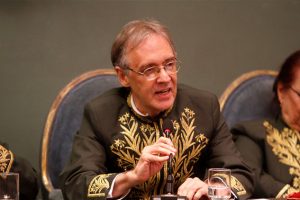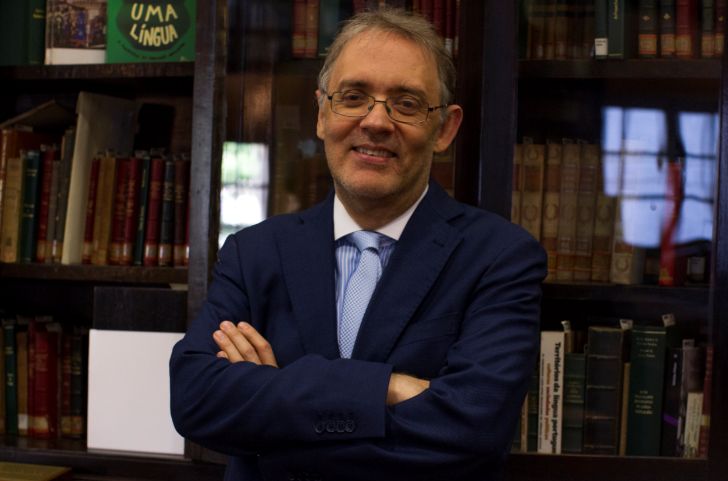São Paulo – The president of the Academia Brasileira de Letras (ABL), Marco Americo Lucchesi, is an Italian-descendant, but his professional career had many encounters with the Arab world. A man of multiple titles – poet, novelist, memorialist, essayist, translator, editor and professor – Lucchesi speaks Arabic, and his story includes everything from a participation in an Arabic anthology to writings inspired by his experiences in the Arab countries to dialogues with Arab figures and authors.
Lucchesi has assumed his third term as ABL president last December after an established career in literature, defense of human rights, and university teaching, and opening talks in the sectors he worked on, especially in literature, in several countries. His desire to learn took him many places. “Literature for me has many voices, many languages, many nations,” he says.

The Brazilian author has held the chair 15 in ABL since March 2011 and teaches comparative literature in the Federal University of Rio de Janeiro (UFRJ). He started publishing books as a teenager. His most famous works are poetry books Meridiano celeste & bestiário, Sphera, and Faces da utopia, and essay books A memória de Ulisses, A paixão do infinito, Teatro alquímico and O sorriso do caos. His works, texts and poems have been translated into around 20 languages, including Arabic.
Lucchesi’s curiosity made him want to learn more about the Arab countries still as a kid, when the Arab candy vendor passed in front of his house in Niterói, Rio de Janeiro. Then eight years old, he asked his dad to took him to Saara, the market in Rio that sells Arab products. Once there, Lucchesi asked the Lebanese traders how to say this and that word in Arabic. “Then they wrote on a pad,” he says.
Some years later, the future writer received an Arabic grammar. He started studying the language, reading Arab poets and traveling through their countries. “The Arab world came as an important reading material – the poets, philosophers, the language itself that has always overwhelmed me,” he says. Lucchesi says that beauty of the writing and pronunciation, and the Arab words sinuosity impressed him deeply.
The chance to speak the language made the author build a multifaced history with the Arabs. “I saw that speaking Arabic would open a fascinating perspective of intimacy and approximation,” he says, recounting his tour to the Palestinian refugee camps of Sabra and Shatila in Lebanon in the 1990s. During the Lebanese civil war, groups supported by Israel invaded and killed hundreds of people in the camps.
Lucchesi says that speaking Arabic gave him the chance to experience the camps through the eyes of the children, old people, and women living there. “Thus, I saw the camp both in the most privileged way possible and the most heartbreaking,” he says, pointing out he heard from the women that there wasn’t enough space to bury the dead after the massacre. “I’m proud to speak Arabic; it’s a loving pride, a pride of the closeness, of belonging to a process,” he says.
Another beautiful but sad story of Marco Lucchesi with the Arab world is a friendship made in Syria, whose memories are described in his book Os olhos do deserto published in 2000 and republished as an e-book in 2019. It’s a books of memories of the Arab countries he visited, including the interaction with Italian priest Paolo Dall’Oglio, who lived in a Jesuit monastery in the Syrian desert.
Lucchesi sought out the priest by the recommendations of friends. They became friends, but Paolo disappeared after going to a meeting with ISIS founder Abu Bakr al-Baghdadi. Years later, Lucchesi published Os olhos do deserto, which includes the letters the priest wrote to him. “I made sure to not distribute and only send it to libraries because I wasn’t sure whether he was still alive,” he says.
In the letters, the priest talked about his concerns. “He foresaw a huge disaster would take place in Syria and at the same time showed a will to take the risks, including facing death if needed be,” he says. Paolo Dall’Oglio name was even considered for the Nobel Peace Prize.
Since an early age, Lucchesi learned about the great Arab writers and met some of them. Now-deceased Egyptian author Nagib Mahfouz, who had won the Nobel Literature Prize in 1988, welcomed the Brazilian in his home in Cairo in the 1990s. “I was an avid reader of his books, his famous trilogy,” he says on the Cairo Trilogy by Mahfouz. Lucchesi points out that he was welcomed with mango juice in the middle of Ramadan and asked the Egyptian about the characters in the books and his plans for the next books.
The author also met Syrian poet Adonis for a chat in a café in Paris and talked on the phone with Palestinian writer Mahmoud Darwish, who died in 2008. Lucchesi called him to talk about his works’ publishing rights and told Darwish he had read Mural while in Rome in the middle of the ruins. “One of the most beautiful Arabic poems written in the 20th century, and not just in the 20th century,” the author says about Mural, Darwish book from 1997 on his experience of being close to death.
The list of Arab authors that marked Lucchesi is vast and his encounters have often become poems, essays, and memories. His encounter with Mahfouz, for example, is in Saudades do Paraíso, a memory book first published in 1997 and republished as an e-book in 2019. It also includes his memories of another Arab country, Morocco.
The Brazilian published a book called Caminhos do Islã in 2002 where he brings together texts by experts on Islam. Lucchesi describes the work as non-religious but a poetic and aesthetic statement. At the time, there were much criticism against Islam, and he wanted to show that the religion had made important contributions to the world. Lucchesi’s book was nominated to Prêmio Portugal Telecom a year after it was published.
When Lucchesi starts talking about the Arab world, he has much to say. His travels included passages through Egypt, Morocco, Mauritania, Saudi Arabia, Lebanon, Syria, Jordan, Oman and the United Arab Emirates. Oman is the most recent. Marco Lucchesi was in the country last January and met officials to discuss the collaboration in peace and dialogue projects.
Despite his tours through the Arab literature and countries, though, the region isn’t the focus of his works, where he shows multiple interests for the globe and its topics. Philosophy of mathematics and Romanian literature are some of his current interests. “A writer has many houses and believes the planet is his home,” he says.
Lucchesi sees literature as a place for dialogue, multidisciplinarity, where the differences don’t need to be demonized but welcomed. In addition to his dedication to literature and university, Lucchesi works with human rights, visiting prisons, quilombos, indigenous communities, and other disadvantaged groups, where he takes books, dialogue, and other activities.
Some texts by Lucchesi were part of an Arabic anthology of Brazilian authors launched last April at the Abu Dhabi International Book Fair in the UAE. The Arab Brazilian Chamber of Commerce supported the project. The anthology brought together texts by 12 authors. Lucchesi attended the launching event in the fair, so did Arab Chamber cultural director Silvia Antibas.
Translated by Guilherme Miranda




